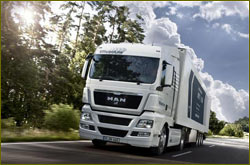04.12.2011 07:32

MAN aims to capitalise on the strong rebound of Russia’s economy by setting up its first factory in Europe’s largest heavy vehicle market.
The German truck and diesel engine maker will this week announce a plan to start production in St Petersburg, two people close to the situation said.
Georg Pachta-Reyhofen, MAN’s chief executive officer, will sign an investment agreement with St Petersburg’s governor on Thursday, these people said.
The plant will be a fully-fledged assembly site and make use of an already existing facility that will allow MAN to kick off production quickly.
The move underlined how European truck makers are keen on tapping emerging markets’ vast appetite for heavy vehicles, which exceeds the sales volume on their home continent.
MAN, which declined to comment on the plans, sees itself at the forefront of a foray into the world’s largest emerging markets after it rapidly expanded in China, India and Brazil in the past few years through acquisitions and joint ventures.
The German group owns a stake in China’s Sinotruk, has bought Volkswagen’s market-leading heavy truck business in Brazil more than two years ago and has a joint venture plant with India’s Force Motors since 2007. It also operates a truck plant in Poland.
Russia’s truck market collapsed during the financial crisis, but is now rebounding rapidly on the back of rising oil and mineral prices and broader economic growth.
According to the Moscow-based Association of European Businesses, sales of foreign-brand heavy trucks (weighing 16 tonnes or more) in Russia reached 11,989 units last year, up 154 per cent on 2009.
According to the group, MAN was the best-selling foreign brand for that segment last year, followed by Scania, Iveco, Volvo, and Mercedes-Benz. MAN sold 3,242 heavy trucks in Russia last year, a 241 per cent rise on 2009.
The AEB data only cover brand represented by the group’s Commercial Vehicles Committee, and so exclude non-members, including Russian producers like Kamaz.
Analysts said MAN’s plan also reflected the fact that Russia levies import duties on foreign trucks that do not meet minimum thresholds for local content.
“Import tariffs amount to 30 per cent and Russia considers further raising these to encourage local production,” Daniel Schwarz, analyst at Commerzbank, said. “Local production is essentially a pre-requisite for participating in the growth potential of Russia.”
Several non-Russian producers have already set up local assembly operations.
Germany’s Daimler owns a 11 per cent stake in Kamaz and has two joint ventures for its Mercedes and Fuso brands with the Russian group.
Volvo opened a truck assembly plant in Kaluga, south-east of Moscow in 2009, where the group makes Volvo and Renault-brand trucks.
Rival Swedish producer Scania in 2009 opened a “delivery centre” for truck assembly in St Petersburg, with capacity to assemble about 5,000 truck chassis and 1,500 superstructures per year.
Fiat’s Iveco brand, which assembled trucks in Russia in a joint venture until last year, is looking to re-establish local assembly.
News source: The Financial Times Ltd
 Print this news Print this news
Business news archive for 12 April' 2011.
Business news archive for April' 2011.
Business news archive for 2011 year.
|